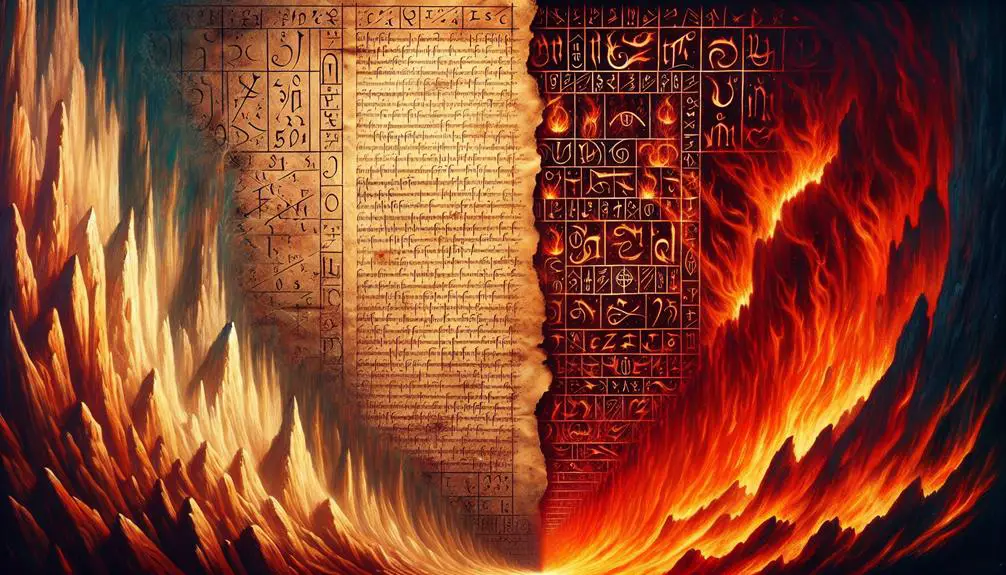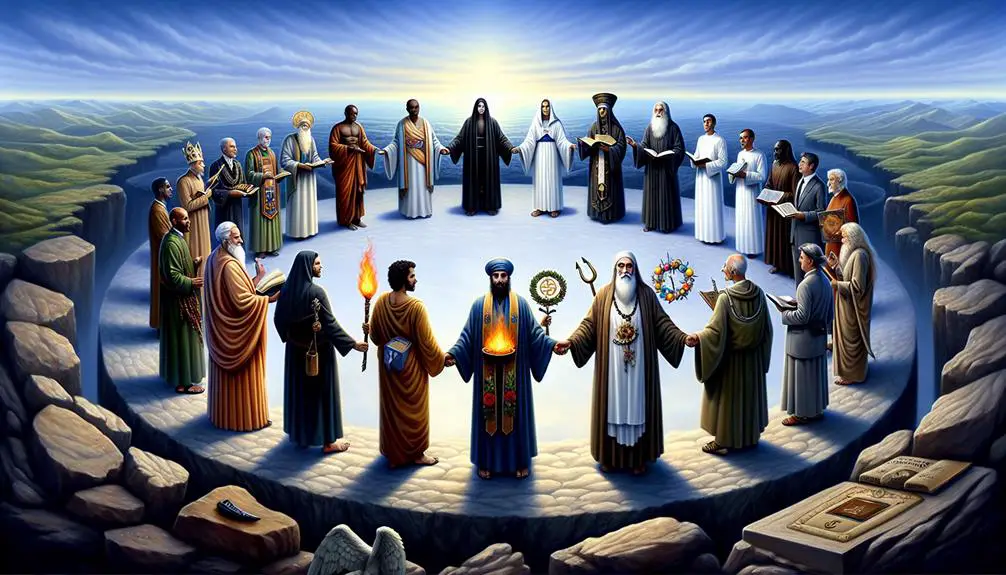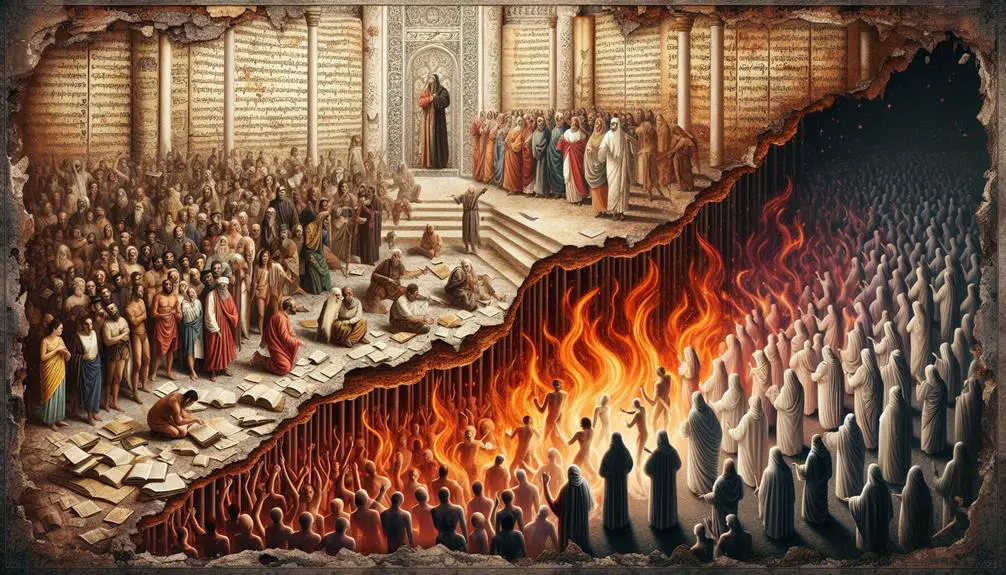Keep an open mind as we delve into the fiery depths of 'Hell' in the Bible, revealing layers beyond its initial infernal impression.

Is Hell a Bad Word in the Bible
Just as Dante embarked on a journey through the inferno, you might find yourself traversing the complex landscape of the word 'Hell' within the Bible.
You've probably heard it tossed around in sermons or debated in theological discussions, but is 'Hell' truly a bad word, or does its significance run deeper than its surface-level connotations might suggest?
Understanding its origins, how it's depicted across Testaments, and the challenges in translation and interpretation, not to mention the varying perspectives from different denominations, could change your view entirely.
This exploration might just reveal more about the theological and cultural fabric of Christianity than you expect, leaving you to ponder its true implications.
Key Takeaways
- The concept of hell evolved from neutral afterlife locations to places of punishment influenced by cultural and linguistic shifts.
- Interpretations of "hell" vary significantly across different Bible translations and denominations, reflecting theological and historical contexts.
- "Hell" is not inherently a "bad word"; its perception depends on doctrinal beliefs about afterlife justice and moral accountability.
- Denominational views on hell range from eternal separation due to sin to metaphorical or transformative experiences, emphasizing the role of free will.
Origins of 'Hell' in Scripture

In tracing the origins of the term 'hell' within biblical scripture, it's crucial to recognize that its conceptualization and interpretation have evolved significantly over time. Hell's etymology is deeply rooted in several ancient languages, reflecting diverse afterlife concepts across cultures. Initially, the word derived from Old English 'hel', itself stemming from Proto-Germanic *haljo, meaning 'the underworld' or 'concealed place'. This notion aligns with early Judaic beliefs, where Sheol represented a shadowy afterlife realm, indifferent to morality.
As you delve deeper, it becomes apparent that hell's depiction isn't static but a tapestry woven from various theological and philosophical threads. Greek influence introduced Hades into Jewish eschatology, infusing it with nuances of punishment and reward. Yet, it's in the intertestamental literature where the idea of a punitive afterlife begins to crystallize, bridging ancient Sheol and the fiery Gehenna of later Christian thought.
Understanding hell's etymology and the evolution of afterlife concepts is essential for comprehending its multifaceted portrayal in scripture. These foundations highlight a complex evolution from a place of mere existence post-mortem to a realm of moral retribution.
Hell's Depiction Across Testaments

Building on the understanding of hell's etymology and its evolution, it's crucial to examine how this concept is portrayed differently in the Old and New Testaments. In the Old Testament, the concept of hell isn't explicitly detailed as a place of eternal torment for the wicked. Instead, Sheol concepts dominate, referring to a shadowy place of the dead, neutral concerning moral judgment. It's a resting place for all souls, irrespective of their moral conduct in life.
Transitioning to the New Testament, the depiction shifts significantly. Here, Gehenna references become prevalent, illustrating hell as a place of punishment and eternal separation from God. This evolution reflects a more developed understanding of the afterlife, where one's actions on Earth influence their eternal destiny. Gehenna, originally a physical location outside Jerusalem associated with the burning of waste and, metaphorically, with divine judgment, becomes a symbol for the final place of punishment for the wicked.
This contrast between the Testaments highlights a theological development in the conceptualization of the afterlife and moral accountability. The Old Testament's Sheol concepts lay the groundwork, while the New Testament's Gehenna references offer a more defined vision of hell as a place of eternal punishment.
Translation and Interpretation Challenges

Understanding the concept of hell across different translations of the Bible presents significant challenges, as nuances in language can alter interpretations. You're navigating a complex terrain where linguistic nuances and historical context significantly influence how hell is understood. Each translation of the Bible carries its own set of interpretations, often reflecting the historical period and cultural context in which it was produced. This means that words and phrases related to hell can vary widely in meaning, depending on the version you're reading.
You need to consider that the original texts of the Bible were written in Hebrew, Aramaic, and Greek. The translation of these languages into English or any other modern language involves not just a literal word-for-word translation but also an interpretation of what the original authors intended to convey. This interpretative process is fraught with difficulties, as it requires a deep understanding of the ancient languages, as well as the cultural and historical contexts in which these texts were written.
Moreover, the concept of hell itself has evolved over time, influenced by theological debates and shifts in religious belief systems. As you delve into the translations and interpretations of biblical texts, you're engaging with a centuries-long debate that has shaped and reshaped the understanding of hell in profound ways.
Denominational Perspectives on Hell

You'll find that denominational perspectives on Hell vary significantly across Christianity.
The Catholic Church has a well-defined doctrine on Hell, which contrasts with the diverse Protestant interpretations that stem from differing scriptural analyses.
Meanwhile, the Eastern Orthodox Church offers unique insights, emphasizing the state of being rather than a place of torment.
Catholic View on Hell
In Catholic theology, Hell is fundamentally understood as the state of eternal separation from God, reserved for those who die in a state of mortal sin without repenting. This perspective emphasizes the importance of free will and the consequences of one's actions, highlighting a framework of afterlife justice.
Concept |
Explanation |
|---|---|
Mortal Sin |
A grave act committed with full knowledge and deliberate consent. |
Eternal Separation |
The ultimate consequence for unrepented mortal sin. |
Purgatory |
A temporary state for purification, not to be confused with Hell. |
Free Will |
The ability to choose between good and evil. |
Afterlife Justice |
The belief that one's eternal destiny reflects their earthly life's choices. |
Catholics advocate for a life of repentance and conversion, aiming to align closer with divine will and avoid the eternal separation depicted in their understanding of Hell.
Protestant Interpretations
While Catholic theology presents a specific view on Hell, Protestant denominations offer a range of interpretations, each reflecting distinct theological principles. Delving into Hell's etymology, you'll find its meaning has evolved, influencing various Protestant perspectives. Some view Hell as a literal place of eternal punishment, while others interpret it metaphorically, emphasizing a state of separation from God rather than physical torment.
The Predestination controversy further complicates Protestant views on Hell. This debate centers on whether salvation and damnation are predetermined, affecting interpretations of who ends up in Hell. Calvinists, for instance, argue for predestination, suggesting that Hell is reserved for those not elected by God. In contrast, Arminians advocate for free will, positing that individuals have a choice in their eternal destiny, thus influencing their perception of Hell.
Eastern Orthodox Insights
Turning to the Eastern Orthodox Church, we find a nuanced understanding of Hell that diverges significantly from both Catholic and Protestant interpretations. In Orthodox traditions, the concept of Hell isn't framed as a place of eternal punishment designed by God to inflict suffering. Instead, it's seen through the lens of the Paschal mystery, emphasizing a transformative experience rooted in one's personal response to God's love and presence.
Hell, then, isn't a separate realm created by God but a state of being that reflects an individual's rejection of or separation from God. This perspective underscores a dynamic relationship with the divine, where the experience of Hell or Heaven hinges on the personal reception of God's unending love and mercy.
Theological Implications of Hell

You'll find that the concept of Hell, with its interpretive variations, presents a complex challenge for theologians.
The debate over whether Hell signifies eternal punishment or a metaphorical separation from God underscores the diversity of thought within Christian theology.
This discussion critically impacts how sin, redemption, and divine justice are understood within the Christian faith.
Hell's Interpretive Variations
The interpretation of Hell varies significantly across different theological traditions, each with profound implications for faith and doctrine. You'll find that linguistic evolution and artistic representations have played crucial roles in shaping these interpretations. Let's delve into how various beliefs perceive Hell.
Tradition |
View on Hell |
|---|---|
Christianity |
A place of eternal punishment for the wicked. |
Judaism |
More nuanced, often seen as a place of purification rather than eternal torment. |
Islam |
Similarly to Christianity, a place of punishment for non-believers and the wicked, but also with an emphasis on divine mercy. |
These divergent interpretations highlight the complexity of understanding Hell, reflecting its deep roots in religious texts and the impact of cultural interpretations over centuries.
Eternal Punishment Debate
Within theological discourse, opinions diverge sharply on whether Hell represents eternal punishment, a debate that fundamentally alters perceptions of divine justice and mercy. You'll find this division deeply entwined with the Universalism debate, which posits that ultimately, all souls will be reconciled to God, challenging traditional views of Hell as a place of unending torment.
This discourse hinges significantly on interpretations of afterlife experiences described in sacred texts. Proponents of eternal punishment argue such descriptions underscore the necessity of moral rectitude and the reality of divine retribution. Conversely, critics question the morality of eternal damnation, arguing it contradicts the concept of a merciful deity.
Thus, your understanding of Hell's theological implications directly influences your grasp of divine justice, mercy, and the nature of afterlife experiences.
Cultural Influence on Hell's Perception

Cultural perspectives have significantly shaped perceptions of Hell, influencing both its conceptualization and depiction across various societies. This influence can be seen in various forms, from artistic depictions to the psychological effects on individuals and communities. Understanding how culture affects our view of Hell is crucial for a nuanced interpretation of its role in religious texts and human morality.
Here are four key points to consider:
- Artistic Depictions: Across history, artists have visualized Hell in ways that reflect their society's fears, beliefs, and moral judgments. These portrayals often serve as a mirror to the collective psyche, revealing deep-seated anxieties about sin and punishment.
- Psychological Effects: The concept of Hell can have profound psychological implications, shaping individuals' behavior and outlook on life. Fear of eternal punishment can drive moral actions but also induce anxiety and guilt.
- Cultural Narratives: Different cultures have developed their own versions of Hell, each with unique characteristics and lessons. These narratives often serve as cautionary tales, emphasizing the consequences of moral failings.
- Language and Interpretation: The way Hell is described and discussed can vary significantly, with language playing a key role in shaping its perception. This includes translations of sacred texts and the colloquial use of the term in everyday speech.
Frequently Asked Questions
How Do Children's Interpretations of Hell Differ From Adults, and How Does This Impact Their Spiritual Development?
You'll find that children's interpretations of hell, shaped by childhood innocence, often differ markedly from adults'.
While adults may view hell through doctrinal lenses, kids often understand it through the prism of spiritual stories, impacting their spiritual development uniquely.
This divergence can lead to a more imaginative, yet sometimes more fearful, conception of spirituality in young minds, underscoring the importance of mindful discussions about such concepts within their growth journey.
Are There Any Psychological Effects on Individuals Who Strongly Believe in the Concept of Hell, Particularly in Relation to Fear or Anxiety?
If you strongly believe in the concept of hell, it might affect your mental health, potentially triggering fear or anxiety. Research suggests that these beliefs can influence your coping mechanisms, either by fostering resilience in the face of adversity or, conversely, by heightening feelings of dread and worry.
Understanding the psychological impact of such beliefs is crucial, as it sheds light on the complex interplay between spirituality and mental well-being.
How Has the Portrayal of Hell in Popular Media (Films, Books, Video Games) Influenced Societal Beliefs and Fears About Hell Compared to Traditional Religious Teachings?
As the saying goes, 'A picture is worth a thousand words,' and this rings true when you consider how cinematic demons and game mechanics have reshaped your understanding of hell. These portrayals often exaggerate fears, diverging significantly from traditional teachings.
They amplify the concept with vivid imagery and interactive experiences, leading to a more visceral, albeit often less nuanced, perception of hell in society's collective imagination.
What Are the Historical and Contemporary Debates Among Scholars About the Existence of Hell as a Physical Place Versus a Metaphorical State?
You're diving into a complex debate where scholars clash over hell's nature.
Historically, geographical explorations aimed to pinpoint hell as a physical location, reflecting a literal interpretation.
Nowadays, the shift towards literary symbolism suggests hell might be a metaphorical state, embodying human fears and moral lessons rather than an actual place.
This ongoing discussion reflects the evolving understanding of hell, influenced by cultural, theological, and philosophical perspectives.
How Do Non-Abrahamic Religions and Belief Systems Conceptualize the Idea of Punishment or Retribution in the Afterlife, Compared to the Christian Concept of Hell?
As you explore various belief systems, you'll find that 'as you sow, so shall you reap' aptly applies to the concept of afterlife punishment. Unlike Christianity's hell, many non-Abrahamic religions lean on Karma theory, where one's actions dictate their fate, or ancestral spirits' guidance instead of punitive retribution.
This analytical dive reveals a broader, nuanced spectrum of beliefs about moral accountability beyond the stark imagery of hell.
Conclusion
In conclusion, your exploration of 'hell' reveals a complex tapestry woven from linguistic, theological, and cultural threads. The term's interpretation varies significantly across denominations and translations, reflecting broader debates within Christianity about judgment and the afterlife.
Interestingly, a Pew Research Center study found that 58% of Americans believe in hell, a statistic that underscores the concept's enduring impact on religious and cultural consciousness. This analysis highlights the importance of understanding 'hell' not just as a word, but as a multifaceted belief shaping millions of lives.



Sign up